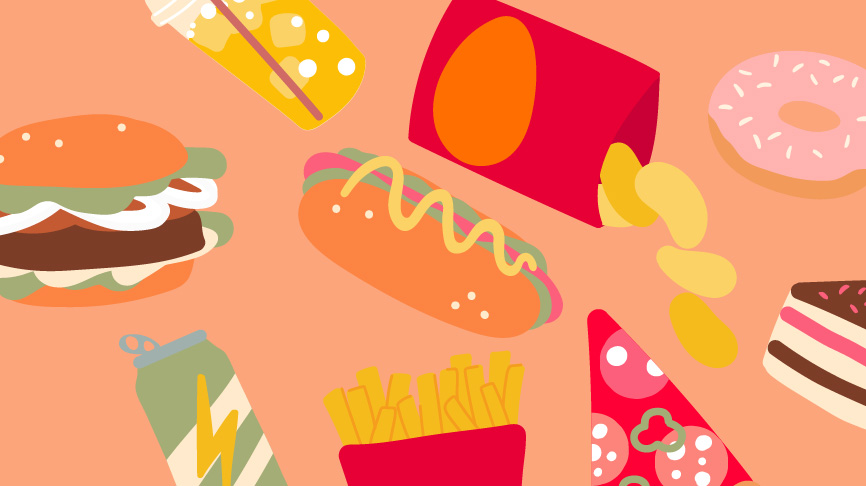Five Foods to Cut Down During Your Period

We all experience periods differently. For some they’re no big deal; for others they’re an inconvenience; and for an unlucky few, debilitating. But no matter whether your go-to tonic is a hot water bottle, a painkiller, or just a couple of days lying low, what you eat can and does affect how you feel during menstruation.
On average, a woman will have 450 periods in her lifetime. At the same time, she’s likely also bombarded with an onslaught of well-meant advice as to what she should or shouldn’t be eating in the name of everything from weight-loss to wellness. This categorically isn’t one of those lists! But if, like many, your period makes you feel less than stellar, equipping yourself with this nutritional know-how might just help.
Cramps, low mood, acne breakouts and bloating are all really common side effects during and in the run-up to a woman’s period. If you’re feeling uncomfortable, then food really might be the best medicine. Try cutting down on these particular foods, swapping for a nourishing alternative – and start feeling better!
Caffeine
Coffee-fiend? Depending on how much you of the stuff you typically knock back it might be worth cutting down during your period. Of course, it’s not just coffee that contains caffeine: you also find it in tea leaves and cocoa beans, and it’s regularly added to some sodas and energy drinks.
But caffeine can amplify the effects of premenstrual syndrome (PMS), cramping in particular. That’s because it’s a diuretic – in other words, it makes you pee and consequently dehydrates the body, amplifying those painful twinges.
As many can attest, caffeine doesn’t only affect the bladder but also the bowel by irritating intestines and stomach lining. Given monthly diarrhea is already a super common period side affect – inflammatory hormones called prostaglandins are to blame – do yourself a favor and cut down on caffeine.
Switch to: Herbal teas – and plenty of water.
Sugary Foods
Find yourself craving sweet treats at that time of the month? That’s because fluctuating hormone levels during and before menstruation mess with blood sugar levels big time. Caving in, though, is only going to amplify that yo-yo effect and by extension, mood swings and fatigue.
In particular, try avoiding refined sugar – think candy, cakes, ice-cream… all the good stuff, unfortunately. Granted it’s not the same, but fructose – the sugar that occurs naturally in fruit – is a much better choice, not least for all the nutrients they provide.
Switch to: Fruit salad, natural frozen yogurt.
High-fat foods
Trans fats (hello, fried fast food and frosting) and saturated fats (looking at you, meat and dairy) can cause and compound inflammation during your period. On a broader lifestyle note, keeping how much fat you consume in check can help manage estrogen levels, the hormone at the frontline of menstruation.
How so?
Because as well as being produced naturally in the ovaries, estrogen is also made by fat cells.
It goes without saying that fat is an essential cornerstone of a healthy diet – but avoiding carrying too much excess fat may help regulate estrogen for less period discomfort and overall health.
Switch to: Avocados, nuts, oily fish, lean meat.
Alcohol
For most women, periods aren’t a whole lot of fun. If a cheeky glass of wine or your favourite cocktail makes Aunt Flo’s visit that little more bearable, then go ahead and enjoy. However, do bear in mind that booze affects mood and judgement like nobody’s business.
On top of any PMS-induced irritability, that could go down either way. Also good to know: the natural dip in estrogen levels during your period make you more susceptible to pain, with hangovers and cramps unfortunately being no exception.
Needless to say, drinking to excess is never smart – particularly during your period.
Switch to: Moderation!
Salt
It may make food taste delicious, but too much salt is bad for us. In particular, it can increase blood pressure, which is a key cause of cardiovascular disease.
Those risks aside, many women also report that eating salty food during their period exacerbates cramping, fluid retention and bloating.
Limited salt intake is sensible at all times (in the US, the FDA recommends no more than 2,300 milligrams of sodium daily), but if cramps are cramping your style, then try cutting down during your period.
Switch to: Herbs and spices
Final Thoughts
For most women, periods are a totally run-of-the-mill monthly occurrence. They shouldn’t be causing drastic changes to lifestyle – if they are do speak to your doctor! – and the same goes for your diet. However, certain small tweaks may help lessen discomfort alongside boosting overall health. Give them a go, and feel better!
Please note that advice offered by Intimina may not be relevant to your individual case. For specific concerns regarding your health, always consult your physician or other licensed medical practitioners

A collective group of “lady experts” at Intimina who love sharing our personal experiences, even when they are a little too personal. We believe it’s time to start breaking down the taboos around menstruation, motherhood, and menopause, and start owning our female health.


